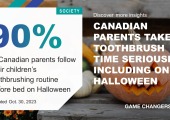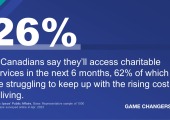2006 RBC Home Renovation Survey
Renovating Tops Relocating: Canadians Prefer Improving To Moving
Almost half (48 per cent) are planning to do the renovation themselves, and 40 per cent will be using a contractor ?an upward trend since 2004. Fewer plan to complete the reno with family (15 per cent) - a downward trend over the last two years.
According to the RBC survey, Canadians planning renovations indicated they plan to spend $8,982 on average ?up slightly from 2005. To finance their reno expenditures, these Canadians will be less likely to tap into cash or savings than they were two years ago (48 per cent in 2006 compared to 69 per cent in 2004. The two alternate options most often cited by those surveyed who didn't want to use their cash or savings: lines of credit (38 per cent) and credit cards (26 per cent).
The RBC survey also showed that establishing realistic reno budgets continues to be a concern. Of the 64 per cent of Canadians who budgeted for renos completed over the past two years, four out of every ten went well over their budgets ?on average by 88 per cent. Additionally, only 13 per cent of Canadians planning renos would consider a home equity line of credit or a homeline plan.
The most popular renovations being planned are bathrooms (36 per cent), kitchens (28 per cent) and basements (27 per cent), to make homes more attractive (60 per cent), or to meet the need for more space. Typical home improvements include painting (46 per cent), floors (30 per cent), windows (21 per cent) and roofs (12 per cent).
Top sources of renovation inspiration: so-called Big Box stores (44 per cent) and magazines (39 per cent). Top sources of desperation: time involved in renovating (44 per cent), inconvenience (33 per cent), and overall costs (28 per cent).
These are some of the findings of an RBC Royal Bank poll conducted in English and French by Ipsos Reid between August 17 and 21, 2006. The online survey is based on a randomly selected, nationally representative sample of 2,367 Canadian homeowners. With a representative sample of this size, the results are considered accurate to within ?2.0 percentage points, 19 times out of 20, of what they would have been had the entire adult Canadian population been polled. The margin of error will be larger within regions and for other sub-groupings of the survey population. These data results were statistically weighted to ensure the sample's regional and age/sex composition reflects that of the actual Canadian population according to the 2001 Census data.
More insights about Consumer Goods


![[WEBINAR] KEYS: Global Trends - The Uneasy Decade](/sites/default/files/styles/related_more_insights/public/ct/event/2025-09/thumbnail-templates_0.png?itok=Qh37M2xL)
![[WEBINAR] Canadian EV Adoption Trends in 2025](/sites/default/files/styles/related_more_insights/public/ct/event/2025-01/thumb.png?itok=RSGzZvMm)
![[WEBINAR] Sustainable Packaging: A Potential Avenue of Distinction](/sites/default/files/styles/related_more_insights/public/ct/event/2023-09/SustainablePackaging_WebR_feature%20copy.jpg?itok=X0DpNf_C)